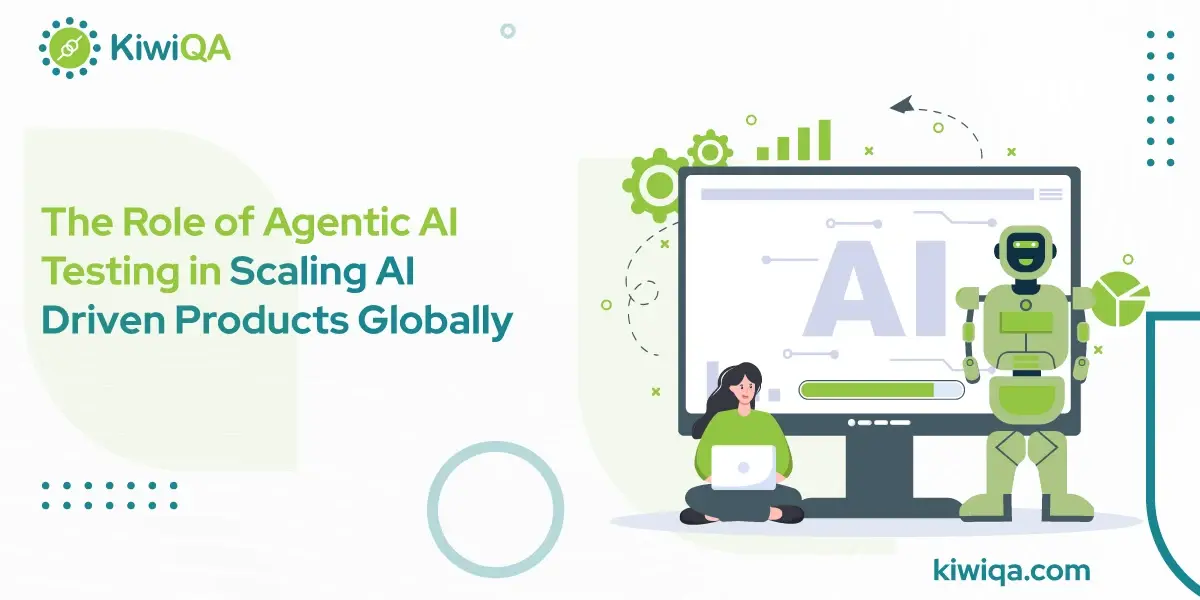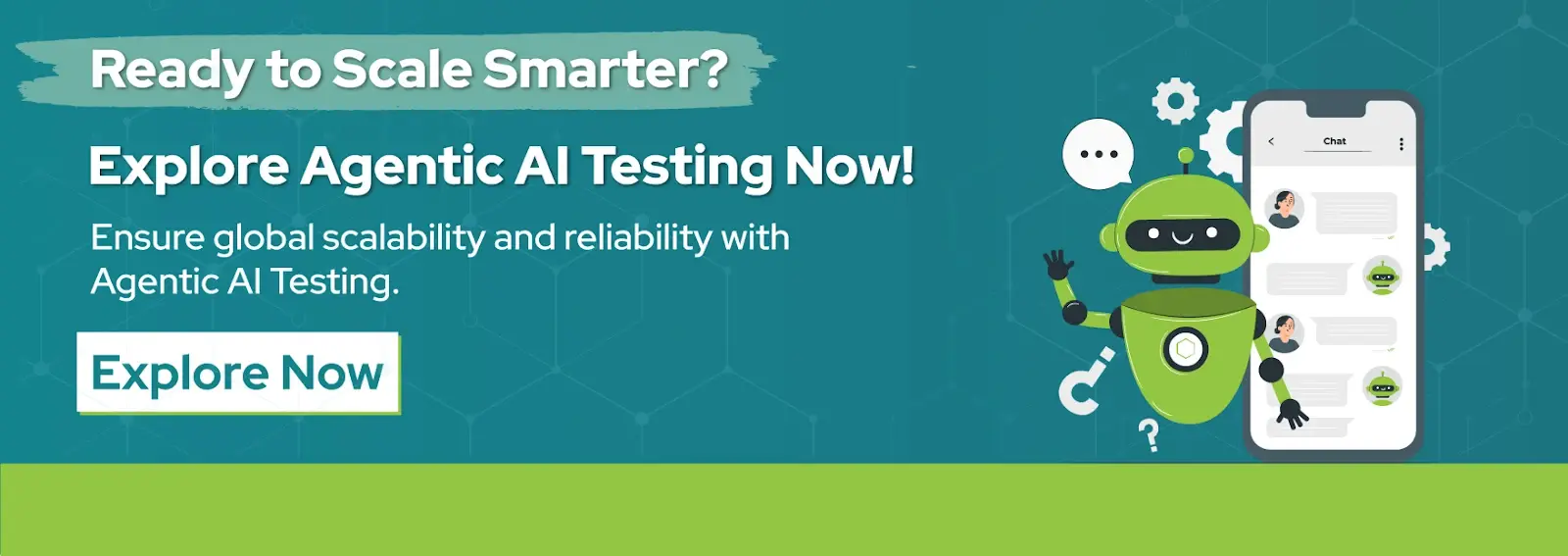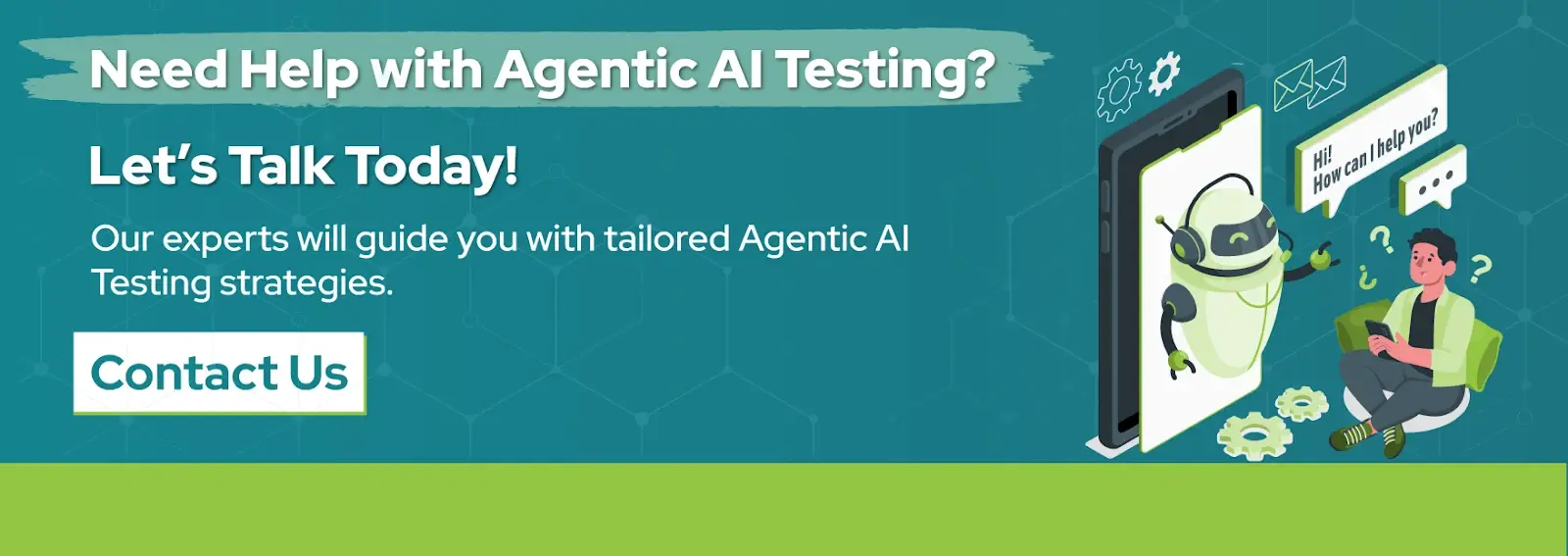Years back, the generative AI wave was sparked by the accessibility tools such as Gemini and ChatGPT that transformed how individuals engaged with transformation. From generating content to coding every feature was turbocharged overnight & everyone found that the solution can dramatically accelerate productivity. Well, there are multiple companies that are cautious around these technologies because they are highly probabilistic models.
Today, we are going to introduce the era of Agentic AI, which is an autonomous & goal-oriented model, plan & collaborate with each other to accelerate faster results. The advanced software development landscape demands agility, speed, and agentic AI testing delivers better speed, intelligence & efficiency.
Have you ever imagined a machine that doesn’t require any instructions & makes its own decisions? Agentic AI has the potential, since it is designed with a rule-based system. It takes goal-driven decisions and working independently in complex environments. Now every industry, from retail to healthcare, is exploring the agentic AI testing models to enhance speed, streamline the operation & address challenges.
Today, organizations are managing complex operations while gaining vast data from customers, making it difficult to obtain quick information. With Agentic AI, continuous tasks can turn out as an automated operation. With faster data-driven actions, it can limit human reliance. Furthermore, it allows the team to prioritize the critical tasks & respond smartly to market shifts. To know how it helps for scaling AI-driven products globally, read the blog.
Agentic AI’s growing enterprise footprint
Unlike traditional tools, Agentic AI testing uses autonomous AI agents to understand & interact with apps like human testers. These AI agents leverage advanced ML to notice interfaces, describe functionality & make data-driven decisions. They adapt & improve testing strategies to bring intelligence to the process. Agentic AI crafts a digital workforce that plans, collaborates & offers real-time support across the comprehensive testing lifecycle.
Deloitte predicts that 25% of businesses will utilize Genai and launch the Agentic AI pilot concept in 2025. The modern enterprise demands frequent operational speed, drives efficiency & accelerated product quality. As organization aims to deliver innovative AI-driven products faster than ever, the popularity of agentic AI software testing drives. Multiple enterprises are adopting Agentic AI as a model to reshape their decision-making, workflow & automation.
By 2028, it will be the most popular AI model of the era. Reports by Gartner said, Agentic AI will be implemented in 33% of businesses by 2028, resulting in 80% of positive changes in complex customer service & saving 30% of cost by 2029. Almost 40% of enterprises rely on AI to boost employee behavior by 2028. Even IBM & Salesforce expect 1 billion AI agents to be operational worldwide by 2026. By 2029, 10% of boards worldwide are expected to turn on AI for advice on important executive decisions.
A recent research states that 80% of customer service worldwide will be carried out by machines, with the strong expected growth from Indian firms. Agentic AI for software testing plays a strong role in making decisions for 10% industry boards & 15% of workflow operations. Gartner reports said 25% of firms’ cybersecurity incidents will be due to misuse of an AI agent by 2028. Although technical proficiency is important, Agentic AI’s true power lies in its capacity to adjust to industry-specific requirements, such as those aiming for accuracy, speed, or scalability.
By creating a cooperative, intelligent ecosystem of specialized agents, agentic AI in testing is radically changing the test automation environment. The effectiveness of API test automation services is also greatly impacted by this conceptual change, which goes beyond conventional scripted automation and promotes a dynamic and adaptable testing environment.
Understanding Agentic AI
● What is Agentic AI?
The growing enterprise landscape makes Agentic AI the most transformative innovation of the era. AI has witnessed the vast development from conceptual theories to practical uses. An AI system allows multiple organizational sectors, including finance & healthcare, to transform software testing technology. It brings revolutionary shifts to the existing software quality assurance methods.
Agentic AI intelligent testing services are no longer a specialized field. Customer center, workplace training, IT development, and other fields are being revolutionized by technology. By combining data from various internal systems, creating organized learning modules, and even creating assessments for agents. As the complexities in AI systems increase, the need for rigorous testing increases. It empowers the QA team to lower the cost, drive the release cycle & deliver flawless software.
Agentic AI testing tools in test automations leverage the self-healing agents to transform the software QA, drive QA automation & optimization. The Adaptive automation empowers Agentic AI to tackle major points. Team witnesses the transformation with Agentic AI for testing & unlocking the faster market release, enhanced accuracy & cost reduction. As the industry is embracing Agentic AI, a new benchmark is set for scalable & intelligent software testing.
An important advancement in artificial intelligence’s capabilities is the transition from classical to agentic AI. Agentic AI pushes limits by actively engaging in resolving issues and making choice processes, whereas traditional AI assists in automating repetitive tasks. Agentic AI has a wide range of possible uses as AI advances, with the potential to revolutionize industries by offering more flexible and intuitive solutions.
Traditional AI depends on ML models, which simulate the learning & decision-making process. The following models operate by addressing & encoding patterns in a vast amount of data & then use them to understand the NL requests. Agentic AI testing solutions define the AI system that is autonomously designed to make decisions. It collaborates with the scalable characteristic of LLM with the traditional coding practices.
Also Read: Top Browser Compatibility Testing Tools Startups and Enterprises Should Consider
Applications of Agentic AI
● Role of Agentic AI in customer service
Customers acquiring cost 5 times higher than retaining them, and that’s the reason why businesses are depending on intelligent agents to satisfy their customers. Agentic AI allows the customer support team to deliver a quick & personalized service by automating the routine queries. It ensures service representatives have all the data at their fingertips.
Instead of reaching out to various representatives & describing your issues over & over, customers can expect accurate support through Agentic AI. Additionally, customers can use Agentic AI chatbots to get solutions to their queries quickly without seeking help from representatives. Customer service can use Agentic AI for multi-lingual support, effective ticket routing, monitoring cross-selling opportunities & upselling.
● Agentic AI in automation & decision making
By enabling computers to comprehend information, make judgments, and act on their own initiative, agentic AI is revolutionizing artificial intelligence. Compared to conventional AI models that need human input at every level, this represents a considerable breakthrough.
Businesses may now employ predictive analytics with a more proactive approach to enhance their decision-making process, thanks to the emergence of an Agentic AI testing service provider. Agentic AI models are capable of properly predicting business trends and opportunities through the analysis of previous data from other data sources. This allows company executives to use data-driven insights to proactively optimize their business plans.
The Role of Testing in AI Scalability
➥ Why Testing Matters in AI Development?
● Ensures accuracy, reliability, and safety
Testing matters in AI development for verifying the reliability, accuracy & safety by addressing & resolving errors. It addresses security bugs in the earlier phase of SDLC. The proactive approach limits the risks associated with the AI system & helps to build user trust. It improves the effectiveness over time. In case your testing team spends hours executing a test case that can be automated, there is always a probability of human error.
This is when the accuracy of AI works. Manual execution of tests can be time-consuming & a high chance of errors. AI manages this with ease, executes hundreds of tests, and your software functionality stays constant. AI-powered tools deliver unparalleled precision, ensuring the same test gives the same results every single time.
● Validates generalization across diverse markets
For data correctness, system dependability, and compliance in a variety of contexts, validation testing is essential. Prominent corporations have transcended the conventional viewpoint on testing and validation. Use qualitative AI testing solutions with actual users to interact with your intended demographic and acquire their opinions on the usability and functioning of the product. Cross-validation aids in model selection and hyperparameter tweaking by offering a more reliable estimate of the model’s capacity for generalization.
➥ Traditional Testing vs. Agentic AI Testing
● Limitations of rule-based/manual testing
Traditional rule-based testing methodology faces limitations in coverage, speed & adaptability compared to Agentic-AI powered testing. Traditional testing relies on manual effort/pre-designed scripts, which results in a slow & less scalable product. On the other side, Agentic AI utilizes advanced automation with self-healing capabilities.
To overcome the limitations, it uses frequent learning models, results in speed execution, better test coverage & limits maintenance. Since traditional testing is limited in its ability to scale testing efforts, the Agentic AI testing is scalable across multiple platforms because of its automated nature.
Error detection in traditional testing is complicated, but in Agentic AI, errors can be identified with better accuracy & consistency, limiting the risk of issues. Compared to conventional rule-based testing, agentic AI-powered testing provides a more effective, thorough, and flexible method that allows for quicker releases, better quality, and less maintenance.
● Advantages of agentic approaches
Self-directed exploration and adaptive testing are two examples of agentic techniques in AI that have various benefits. Higher test coverage, quicker and more effective testing, less maintenance, improved problem identification, and cheaper expenses are a few of them. AI-powered adaptive tests may also enhance engagement, personalize learning routes, and offer insightful data for improving instructional strategies and learning resources.
Also Read: Cost, Speed, and Quality: Core Benefits of Outsourcing Mobile App Testing
How Agentic AI Testing Works?
➥ Core Principles
● Autonomous test case generation
Agentic AI testing, concern for autonomous test case generation, operates through the Intelligent agents that learn & understand, optimizing the testing process. It doesn’t require manual intervention. Agentic AI revolutionizes the test case generation from a manual/time-consuming process to a scalable & intelligent solution. It results in broader test coverage & results in faster release cycles.
● Environment simulation and interaction
An AI system that incorporates many forms of artificial intelligence to enable planning, performing, learning, and improvement is known as Agentic AI. Agentic AI systems are able to: Make choices in response to shifting circumstances and context. Divide objectives into smaller activities and work towards each one on your own.
● Continuous learning and improvement
Agentic AI is an important development in the growth of AI because of its capacity for independent decision-making. Conventional AI applications need human guidance, but Agentic AI may do intricate tasks with minimal human involvement. Continuous learning in the context of artificial intelligence refers to the following capabilities: Acquiring new information; consistently improving the performance of the AI model. It also refers to the ability to easily adjust to shifting corporate settings and market conditions.
➥ Key Features of Agentic Testing Systems
● Goal-oriented testing behaviors
Goal-oriented behavior, or the ability to accomplish certain goals through independent action and decision-making, is a defining feature of agentic testing systems. Instead of simply executing preset scripts, these systems assess circumstances, make plans, and adjust to meet objectives with little assistance from humans.
● Scenario simulation
Agentic testing methods evaluate an AI agent’s capacity to function independently and accomplish objectives in simulated environments by using scenario simulation. In order to improve the agent’s performance and dependability, this includes creating a variety of realistic scenarios in which it may interact, make decisions, and learn from results.
● Self-evaluation and refinement loops
Through self-healing capabilities, continual learning, and adaptability to changes in user interfaces and applications, agentic testing systems excel in self-evaluation. Through self-healing capabilities, continual learning, and adaptability to changes in user interfaces and applications, agentic testing systems excel in self-evaluation. These systems generate test cases, test methodologies, and overall efficacy repeatedly through feedback, resulting in more robust, effective testing.
Benefits of Agentic AI Testing on a Global Scale-Up
➥ Faster time to market
Agentic AI speeds up the entire QA process by optimizing not just test execution, but also test design, environment setup, and result analysis. For agile and DevOps teams, this facilitates quicker releases without sacrificing quality.
➥ Better localization and contextual accuracy
Because agentic AI testing can comprehend subtleties and adjust to various cultural settings, it performs exceptionally well in localization and contextual correctness, producing more useful and pertinent test results. This is accomplished by analyzing user behavior and adapting to diverse linguistic and cultural situations by utilizing LLM and reinforcement learning.
➥ Continuous validation in live environments
Agentic AI systems are able to run tests continually and independently, giving real-time feedback on the quality of the program. Because tests can adapt to changes in development, this shortens testing time and speeds up release cycles.
➥ Improved reliability and user trust across geography
Through automation, accuracy, and ongoing learning, an agentic AI testing company greatly increases dependability. It makes it possible to identify and fix problems more quickly and reduces human error, which results in more accurate and consistent test performance. Customer interactions are being revolutionized by agentic AI, which offers individualized, responsive experiences quickly and at scale.
Best Practices for Implementing Agentic AI Testing
➥ Define clear objectives and success metrics
To optimize ROI and reduce risk, data leaders must make sure AI agents are appropriately matched with business objectives and pertinent stakeholders, efficiently managed, and continually developed. The direction of development for various departments is kept clear and constrained when it is in line with the company’s objectives. Additionally, this will enhance data culture from the top down and increase support for future data-driven initiatives.
AI agents that are goal-oriented are more likely to act purposefully and adaptively, which increases corporate value. This may be accomplished by matching objectives with quantifiable commercial results and by building the AI to assess several routes to the intended conclusion.
➥ Simulate diverse real-world environments
One essential best practice for putting agentic AI testing into practice is simulating various real-world settings. This guarantees the AI agent’s resilience and dependability under different circumstances. It involves crafting comprehensive test suites, utilizing synthetic data & incorporating HITL testing. Observe the choices and actions of agents in simulated settings.
➥ Monitor and adapt based on live feedback
Data leaders and their teams should set up a systematic feedback loop to monitor and enhance agentic AI performance. They start by establishing business-aligned KPIs. To identify anomalies, create dashboards, and require the usage of automatic notifications. Especially in the early phases of deployment, maintain a human-in-the-loop approach while studying mistakes and decision patterns to pinpoint the underlying reasons.
Make sure that important choices and edge cases are reviewed by a person. To improve agent behavior, use manual tuning and reinforcement learning. Refine and update models on a regular and methodical basis in response to input and evolving business circumstances.
Collaborate across regions and disciplines
The next phase is collaborative agentic AI testing, which includes AI agents that can interact and work together across organizational borders, tasks, and domains.
Elevate Your AI Products with Advanced Agentic AI Testing
Agentic AI is revolutionizing every industry and acts as the crucial solution for decision making & executing tasks. Advanced agentic AI software testing drives both customer experience & operations. Agentic AI is driving every niche, including healthcare, finance, manufacturing & retail.
By utilizing this, enterprises can make real-time decisions, boost efficiency & drive the supply chain. It improves customer experience & drives collaboration with others. If you want to invest in scalable testing frameworks, reach out to an AI testing service provider. Scroll down to learn our other IT blogs for more knowledge.







